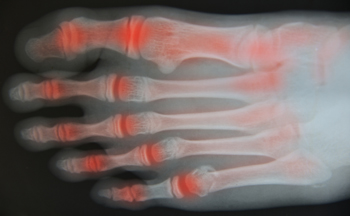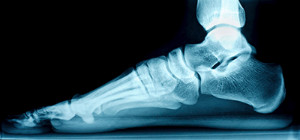Connect With Us
Blog
Items filtered by date: March 2022
What Is Peripheral Neuropathy?
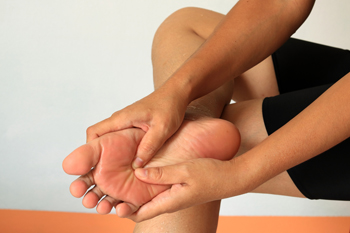 The most common form of peripheral neuropathy affects the feet. When there is a problem affecting the nerves in the feet, one can experience tingling and numbness in the feet, shooting, stabbing, or burning pain there, loss of coordination and balance, and muscle weakness. There is typically an underlying condition for those with this disorder. Those with diabetes and the elderly are most apt to be affected by this condition. Loss of sensation and possible injury to the feet without knowing it is a dangerous combination. It is vital that one who suffers from this type of neuropathy takes proper and daily care of one’s feet. Such care includes keeping feet clean, looking for ingrown toenails, sores or signs of injury, moisturizing feet, and wearing proper fitting shoes. While symptoms can be intermittent, because of the danger involved and the progressive nature of the condition, it is suggested that one consult a podiatrist as early as possible for relief of symptoms and treatment recommendations.
The most common form of peripheral neuropathy affects the feet. When there is a problem affecting the nerves in the feet, one can experience tingling and numbness in the feet, shooting, stabbing, or burning pain there, loss of coordination and balance, and muscle weakness. There is typically an underlying condition for those with this disorder. Those with diabetes and the elderly are most apt to be affected by this condition. Loss of sensation and possible injury to the feet without knowing it is a dangerous combination. It is vital that one who suffers from this type of neuropathy takes proper and daily care of one’s feet. Such care includes keeping feet clean, looking for ingrown toenails, sores or signs of injury, moisturizing feet, and wearing proper fitting shoes. While symptoms can be intermittent, because of the danger involved and the progressive nature of the condition, it is suggested that one consult a podiatrist as early as possible for relief of symptoms and treatment recommendations.
Neuropathy
Neuropathy can be a potentially serious condition, especially if it is left undiagnosed. If you have any concerns that you may be experiencing nerve loss in your feet, consult with one of our podiatrists from Crosstown Podiatry. Our doctors will assess your condition and provide you with quality foot and ankle treatment for neuropathy.
What Is Neuropathy?
Neuropathy is a condition that leads to damage to the nerves in the body. Peripheral neuropathy, or neuropathy that affects your peripheral nervous system, usually occurs in the feet. Neuropathy can be triggered by a number of different causes. Such causes include diabetes, infections, cancers, disorders, and toxic substances.
Symptoms of Neuropathy Include:
- Numbness
- Sensation loss
- Prickling and tingling sensations
- Throbbing, freezing, burning pains
- Muscle weakness
Those with diabetes are at serious risk due to being unable to feel an ulcer on their feet. Diabetics usually also suffer from poor blood circulation. This can lead to the wound not healing, infections occurring, and the limb may have to be amputated.
Treatment
To treat neuropathy in the foot, podiatrists will first diagnose the cause of the neuropathy. Figuring out the underlying cause of the neuropathy will allow the podiatrist to prescribe the best treatment, whether it be caused by diabetes, toxic substance exposure, infection, etc. If the nerve has not died, then it’s possible that sensation may be able to return to the foot.
Pain medication may be issued for pain. Electrical nerve stimulation can be used to stimulate nerves. If the neuropathy is caused from pressure on the nerves, then surgery may be necessary.
If you have any questions, please feel free to contact our offices located in Wayne, Montclair, and Randolph, NJ . We offer the newest diagnostic and treatment technologies for all your foot care needs.
What Are Heel Cups?
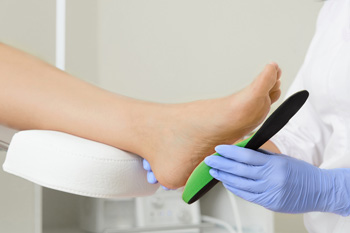 Heel cups are a type of orthotic device. They are placed directly under the heel and provide cushioning and support. Heel cups can help treat heel pain caused by plantar fasciitis, prolonged standing, and more. They can make your shoes more comfortable as you go about your daily activities. Heel cups are typically made of gel, foam, or some other type of cushioning material. They can be bought over-the-counter at many drug and shoe stores. It is best to check with a podiatrist prior to purchasing heel cups to determine if this is the right type of orthotic for you.
Heel cups are a type of orthotic device. They are placed directly under the heel and provide cushioning and support. Heel cups can help treat heel pain caused by plantar fasciitis, prolonged standing, and more. They can make your shoes more comfortable as you go about your daily activities. Heel cups are typically made of gel, foam, or some other type of cushioning material. They can be bought over-the-counter at many drug and shoe stores. It is best to check with a podiatrist prior to purchasing heel cups to determine if this is the right type of orthotic for you.
If you are having discomfort in your feet and would like to try orthotics, contact one of our podiatrists from Crosstown Podiatry. Our doctors can provide the care you need to keep you pain-free and on your feet.
What Are Orthotics?
Orthotics are inserts you can place into your shoes to help with a variety of foot problems such as flat feet or foot pain. Orthotics provide relief and comfort for minor foot and heel pain but can’t correct serious biomechanical problems in your feet.
Over-the-Counter Inserts
Orthotics come in a wide variety of over-the-counter inserts that are used to treat foot pain, heel pain, and minor problems. For example, arch supports can be inserted into your shoes to help correct overarched or flat feet, while gel insoles are often used because they provide comfort and relief from foot and heel pain by alleviating pressure.
Prescription Orthotics
If over-the-counter inserts don’t work for you or if you have a more severe foot concern, it is possible to have your podiatrist prescribe custom orthotics. These high-quality inserts are designed to treat problems such as abnormal motion, plantar fasciitis, and severe forms of heel pain. They can even be used to help patients suffering from diabetes by treating foot ulcers and painful calluses and are usually molded to your feet individually, which allows them to provide full support and comfort.
If you are experiencing minor to severe foot or heel pain, it’s recommended to speak with your podiatrist about the possibilities of using orthotics. A podiatrist can determine which type of orthotic is right for you and allow you to take the first steps towards being pain-free.
If you have any questions please contact our offices located in Wayne, Montclair, and Randolph, NJ . We offer the newest diagnostic and treatment technologies for all your foot and ankle needs.
Psoriatic Arthritis and Foot Care
One of the main targets of psoriatic arthritis (PsA) is your feet and ankles. It can cause swelling, inflammation, stiffness, and difficulty walking, as well as other symptoms. It can also result in a condition known as sausage toes (where the entire toe swells up), heel pain due to the Achilles tendon becoming inflamed, flattening of the arch, and painful calluses or sores over the joints. Because these ailments can be very painful, the tendency is for the sufferer to cease activity, which can actually make the condition worse. Fortunately, you can help to manage these symptoms by changing the type of shoes you wear, doing exercises to strengthen and stretch the feet, and taking non-steroidal anti-inflammatory medication. Anyone with psoriatic arthritis that has severely affected their feet, ankles, and/or toes, would be wise to begin regular visits with a podiatrist who can determine the appropriate course of treatment.
Arthritis can be a difficult condition to live with. If you are seeking treatment, contact one of our podiatrists from Crosstown Podiatry. Our doctors can provide the care you need to keep you pain-free and on your feet.
Arthritic Foot Care
Arthritis is a joint disorder that involves the inflammation of different joints in your body, such as those in your feet. Arthritis is often caused by a degenerative joint disease and causes mild to severe pain in all affected areas. In addition to this, swelling and stiffness in the affected joints can also be a common symptom of arthritis.
In many cases, wearing ill-fitting shoes can worsen the effects and pain of arthritis. Wearing shoes that have a lower heel and extra room can help your feet feel more comfortable. In cases of rheumatoid arthritis, the arch in your foot may become problematic. Buying shoes with proper arch support that contour to your feet can help immensely.
Alleviating Arthritic Pain
- Exercises that stretch the foot can prevent further pain and injury and increase mobility
- Most of the pain can be alleviated with anti-inflammatory drugs, heat, and topical medications
- Massages can help temporarily alleviate pain.
It is best to see your doctor for the treatment that is right for your needs and symptoms. Conditions vary, and a podiatrist can help you determine the right method of care for your feet.
If you have any questions, please feel free to contact our offices located in Wayne, Montclair, and Randolph, NJ . We offer the newest diagnostic tools and technology to treat your foot and ankle needs.
Plantar Warts Can Be Treated!
Preventing Injuries with Stretches
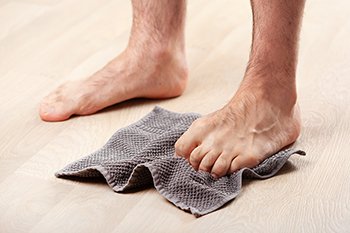 Stretching keeps your feet strong and flexible, helping to prevent injuries from exercising and just going about your day. Foot stretches are generally simple, fast, and don’t require any special equipment. For example, a toe stretch can be done by just sitting in a chair with your feet on the floor and spreading your toes apart for a few seconds at a time. A towel stretch, which requires a towel, involves sitting in a chair and using just your toes to scrunch up the towel and pull it towards you. For more information about foot stretches, please consult with a podiatrist.
Stretching keeps your feet strong and flexible, helping to prevent injuries from exercising and just going about your day. Foot stretches are generally simple, fast, and don’t require any special equipment. For example, a toe stretch can be done by just sitting in a chair with your feet on the floor and spreading your toes apart for a few seconds at a time. A towel stretch, which requires a towel, involves sitting in a chair and using just your toes to scrunch up the towel and pull it towards you. For more information about foot stretches, please consult with a podiatrist.
Stretching the feet is a great way to prevent injuries. If you have any concerns with your feet consult with one of our podiatrists from Crosstown Podiatry. Our doctors will assess your condition and provide you with quality foot and ankle treatment.
Stretching the Feet
Being the backbone of the body, the feet carry your entire weight and can easily become overexerted, causing cramps and pain. As with any body part, stretching your feet can serve many benefits. From increasing flexibility to even providing some pain relief, be sure to give your feet a stretch from time to time. This is especially important for athletes or anyone performing aerobic exercises, but anyone experiencing foot pain or is on their feet constantly should also engage in this practice.
Great ways to stretch your feet:
- Crossing one leg over the others and carefully pull your toes back. Do 10-20 repetitions and repeat the process for each foot
- Face a wall with your arms out and hands flat against the wall. Step back with one foot and keep it flat on the floor while moving the other leg forward. Lean towards the wall until you feel a stretch. Hold for 30 seconds and perform 10 repetitions for each foot
- Be sure not to overextend or push your limbs too hard or you could risk pulling or straining your muscle
Individuals who tend to their feet by regular stretching every day should be able to minimize foot pain and prevent new problems from arising.
If you have any questions, please feel free to contact our offices located in Wayne, Montclair, and Randolph, NJ . We offer the newest diagnostic and treatment technologies for all your foot care needs.
How Common Are Flat Feet?
Flat feet, the condition in which the arches in the center of the sole of the foot are absent when the feet are bearing weight, is quite common. Approximately 8% of adults in the United States have congenital flat feet, which occur when the arches fail to form during early childhood. An additional 4% have fallen arches, flat feet that are acquired due to a preexisting arch collapsing over time. While congenital flat feet are usually asymptomatic, fallen arches can often cause foot pain, cramping, and fatigue. Both people who have flat feet from birth and those who have acquired them over time may have an overpronated gait, a pattern of foot movement in which the feet roll too far inwards while walking. If you have flat feet and foot pain that is bothering you, it is suggested that you see a podiatrist for treatment.
Flatfoot is a condition many people suffer from. If you have flat feet, contact one of our podiatrists from Crosstown Podiatry. Our doctors will treat your foot and ankle needs.
What Are Flat Feet?
Flatfoot is a condition in which the arch of the foot is depressed and the sole of the foot is almost completely in contact with the ground. About 20-30% of the population generally has flat feet because their arches never formed during growth.
Conditions & Problems:
Having flat feet makes it difficult to run or walk because of the stress placed on the ankles.
Alignment – The general alignment of your legs can be disrupted, because the ankles move inward which can cause major discomfort.
Knees – If you have complications with your knees, flat feet can be a contributor to arthritis in that area.
Symptoms
- Pain around the heel or arch area
- Trouble standing on the tip toe
- Swelling around the inside of the ankle
- Flat look to one or both feet
- Having your shoes feel uneven when worn
Treatment
If you are experiencing pain and stress on the foot you may weaken the posterior tibial tendon, which runs around the inside of the ankle.
If you have any questions please feel free to contact our offices located in Wayne, Montclair, and Randolph, NJ . We offer the newest diagnostic and treatment technologies for all your foot and ankle needs.
